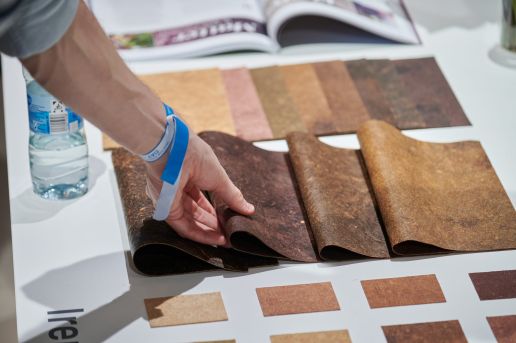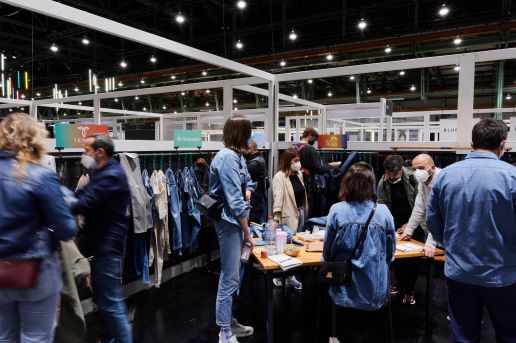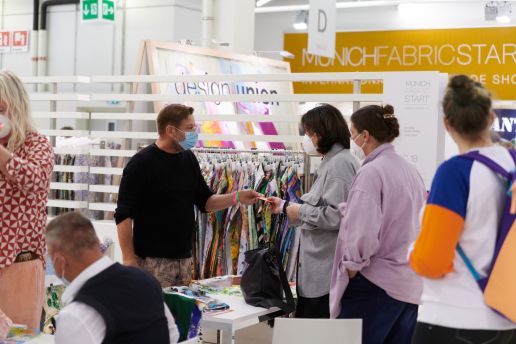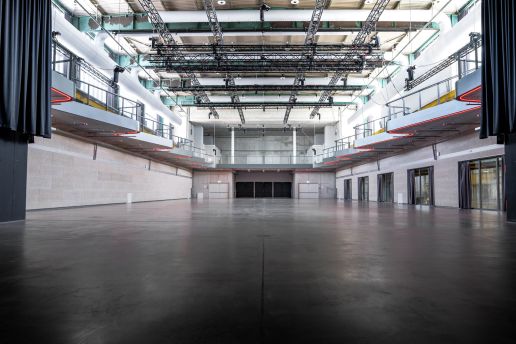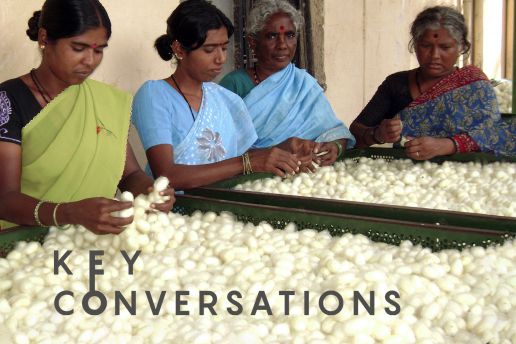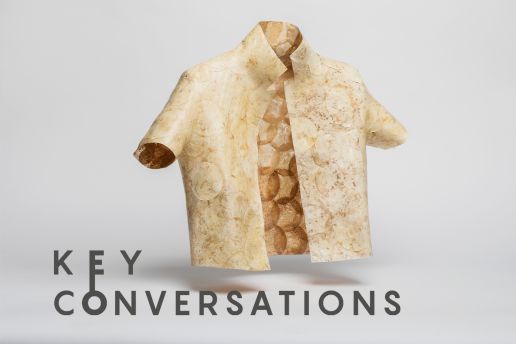innovatives sustainable textiles
The atmospherica industrial charm of keyhouse
In the atmospheric industrial charm of KEYHOUSE, Hall 5, progressive suppliers and global players from cross-industry sectors will be showing their latest new developments and innovations. On more than 1,000 square metres you will find trend-setting smart textiles, future fabrics and new technologies – be it in terms of sustainability, digitalisation, traceability, technology or finishing.
Staged as an interactive think tank, future-oriented show cases will be in the spotlight alongside Sustainable Innovations. This is also where the main lecture forum of MUNICH FABRIC START is located featuring exclusive keynotes, panel discussions, trend presentations, Q&A sessions and expert talks by international industry insiders. Be inspired by the wide range of products on offer at KEYHOUSE.
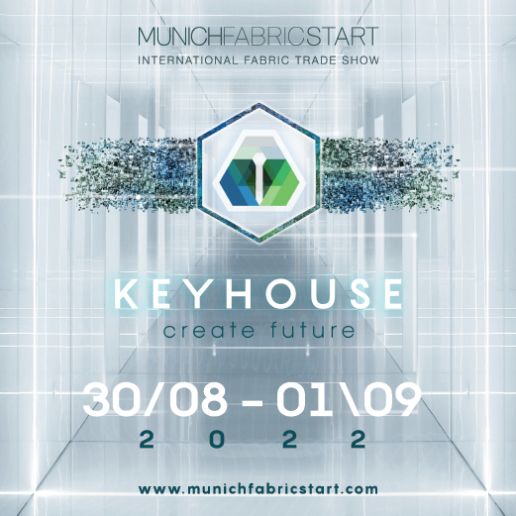
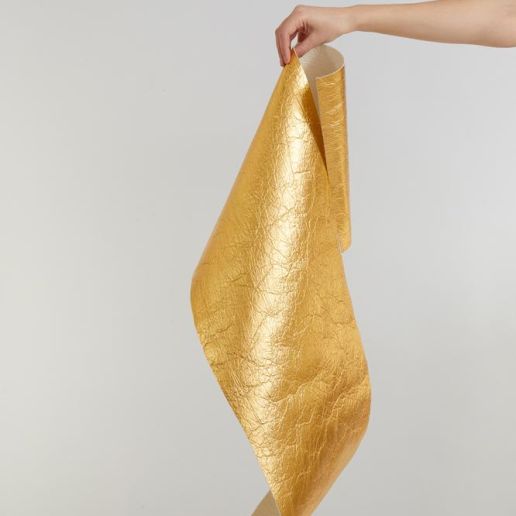
PIÑATEX
Piñatex® by Ananas Anam is a pioneering plant-based textile now made from up to 95% renewable resources. Piñatex is made from agricultural waste, offering a resource efficient alternative to synthetic and virgin grown textiles. Piñatex is available in 22 colours across 4 different collections, with the ability to create custom finishes for orders requiring a bespoke approach
REACTIVE REALITY
Reactive Reality’s PICTOFiT platform creates value for you, your customers and the planet. Their AI can help in all phases of the product lifecycle from design to visual merchandising to shopper experience, purchase and in the Metaverse. To date we have seen increases in shopper engagement of 400%, increases in conversion rate of 55%, and an overall ROI of 500%
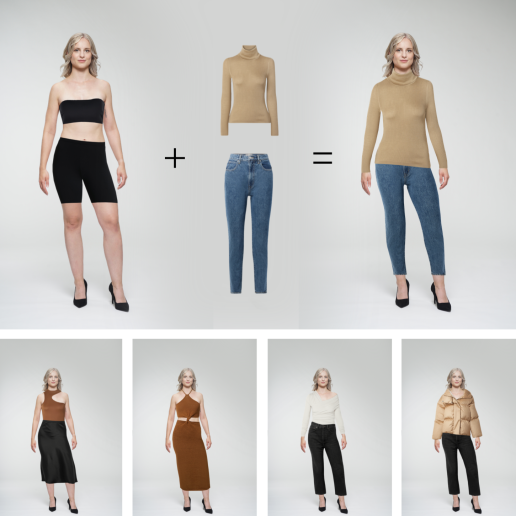
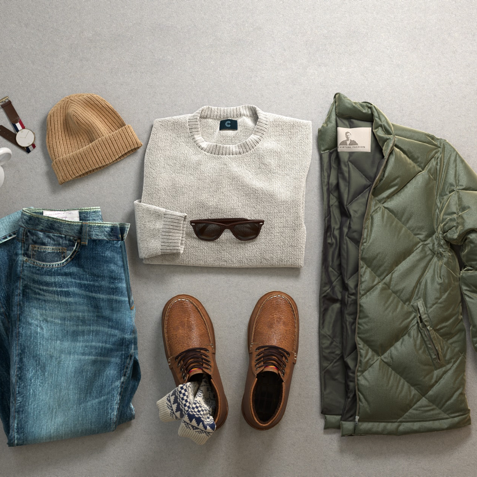
CLO Virtual Fashion
CLO Virtual Fashion is a multinational technology company founded in 2009. With a vision to empower everything related to garments, CLO Virtual Fashion is leading the market by digitally merging, consolidating, and converging all components relating to digital and physical garments through its state-of-the-art 3D Cloth Simulation Algorithm. From 3D garment design software, digital asset management and design development collaborative platform, to consumer-facing services such as virtual fitting on e-commerce, all of CLO Virtual Fashion’s products and services are interconnected to provide clients and users with a more consolidated experience.
MAKEINITALY
MAKEINITALY is a group of technicians in love with a project dedicated to “The Health of the garment we are wearing”. Their innovation is to respect the nature with the re-discovery of traditional Italian textile knowledge. They produce nettle and hemp yarn to create biodegradable fabrics. Dyeing of the fabrics is made with their patent by using vegetable products that reach high and permanent colour fastness.
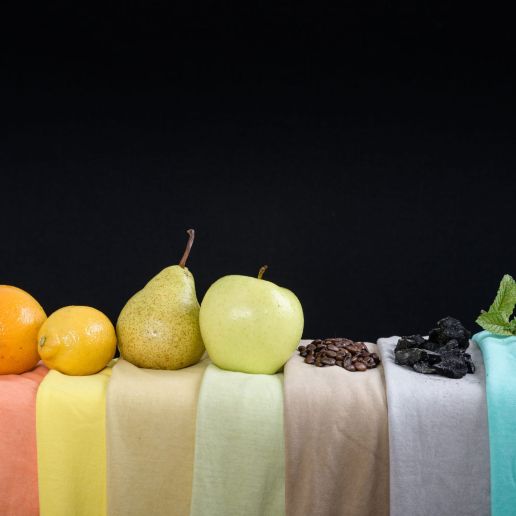
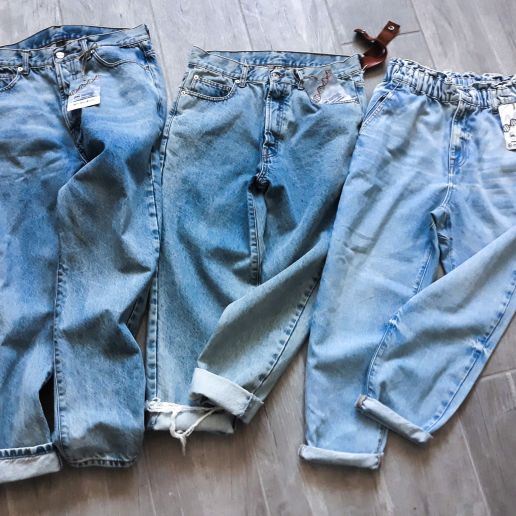
MONTEGA
Montega Chemical Solutions, specialized in production of chemicals for textile treatments, will present THE PERFECT JEANS for a more conscious use of chemicals through application systems with low environmental impact and certified products. This in order to provide guidelines for a more sustainable and truly environmentally friendly production, to be an active part of the change that our planet asks for every day. Find out mor about their solutions and services on their booth at the KEYHOUSE.
EVENT PROGRAM
OF MUNICH FABRIC START & BLUEZONE
AT KEYHOUSE, HALL 5 & THE SEMINAR ZONE, HALL 7
Be inspired by exclusive keynotes, panel discussions, trend presentations, Q&A sessions & Co. by international industry experts.
Look forward to news, insights and first-hand information from the industry.
Discover further industry-disrupting innovations at our upcoming shows:
Key Conversations: Consulting on Sustainable Production
When you meet Chandra Prakash for the first time and ask him ‘What do you do?’, he answers ‘sustainability consultant’ but it only takes one conversation with him to discover that in a moment he goes from working in the fields as an organic farmer to researching and developing sustainable agricultural methods in the production of natural fibers at the India-Nepal border and even more recently, securing the certification process of natural fibers using blockchain technology. Suddenly you realise ‘sustainability consultant’ doesn’t quite sum up the full scope, reach and vast nature of his work. In this interview we scratch the surface to reveal insights into his latest projects, challenges he is facing and his passion for true sustainability.
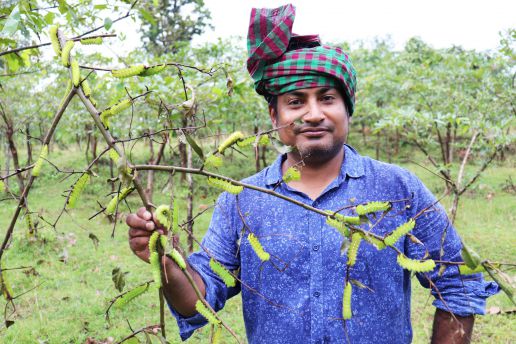
Can you tell us about your work as a sustainable fashion consultant?
I am deeply engaged with sustainable fashion and have gained invaluable insights on the its complicated supply chain from many perspectives; as an organic farmer, a textile designer, a fashion designer and as an entrepreneur selling textiles and fashion garments as the owner and founder of Cocccon specialising in the production of non-violent silk fashion. The creation and knowledge of short- and long-term sustainability road maps are my strength as a sustainability consultant.
You are currently researching other sustainable fibers and production methods, can you tell us what you are focused on?
My research is on natural fibers, in particular how they can be grown using as little water as possible and without chemicals. My current project aims to make the most sustainable and luxurious linen, kenaf & sisal fiber production located at the India-Nepal border.
You appeared in the Key Conversations video series with Simon Angel and introduced your latest technology solution to support the certification process for fabrics. Can you tell us more?
The challenges facing certification bodies have been further compromised by COVID-19. Most cotton fields are on isolated or rural terrain which means it is not possible to oversee or control the entire land. Data collection and entry is still based on trust, with no cross-verification methods. In the current system, it is not possible to authenticate the materials in the pre-fiber stages, such as the agricultural processes for growing fibers like cotton, linen etc. The lack of physical visits due to COVID-19 has resulted in the increase of greenwashing.
The technology I am currently developing can ensure auditing can be easy, safe and much more reliable. Data can also be collected at the agriculture stage. To ensure authentication, surveillance will be carried out at three different stages. Together, the use of AI technology, Blockchain technology and a smart physical auditing system will make the certification process of an organic product fool-proof.
Watch the Key Conversations episode between Chandra Prakash and Simon Angel here.
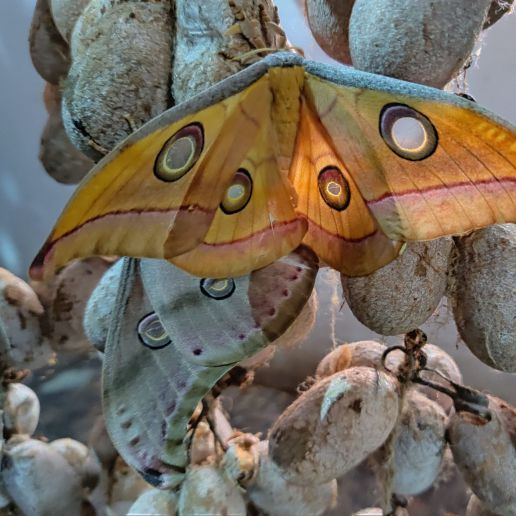
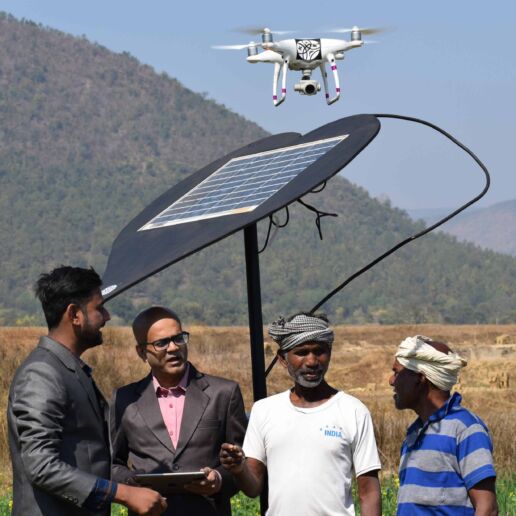
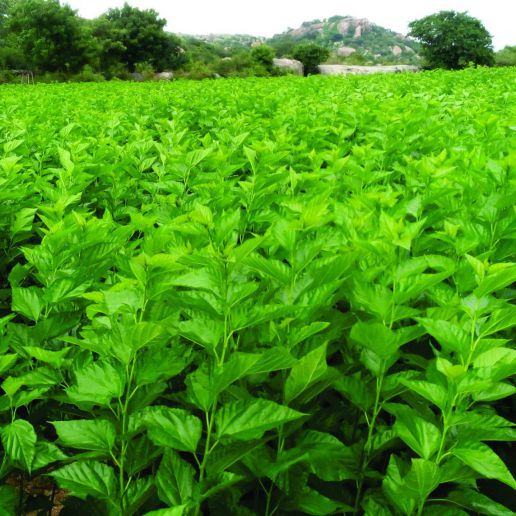
Tell us about the biggest challenge you face in the development of this new digital system?
This is very ambitious project. Traceability at raw material stage is supposed to be next to impossible. I took it as a challenge and worked hard on realising it. Connecting different kinds and levels of technology is always a challenge. Let’s just say we are working on it! We will need to work with partners from the fashion Industry including raw material and blockchain experts as well as crucial investors. We are currently looking for a CFO to join us as well.
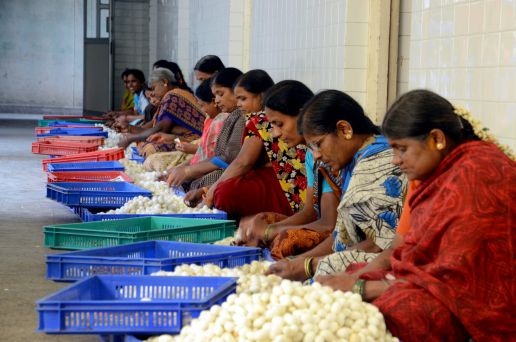
How important is it for brands to offer transparency and traceability to their consumers? i.e adopting blockchain technology.
The number of people willing to buy authentic sustainable garments or fashion accessories has increased drastically. The young adults, teens and children who are protesting at Fridays for Future and climate strikes across the world are our future clients. They want to know who made the clothes they wear. They want to know if everyone was treated well in the supply chain. They want to know if their organic t-shirt is really an organic. Traceability will be the new normal soon. Our AI & machine learning technology can help everyone from brands to end consumers. Using Blockchain can ensure certifications are reliable and authentic.
Germany will introduce new Supply Chain laws with increased focus on human rights. Can your technology help avoid human right violations?
Current regulations have limited say and access to controlling social or human factors during the production stage of raw materials. There are also challenges in checking for forced or child laborer’s at cotton and flax-linen farming. 80% of cotton farmers working in developing nations are from local tribal communities and have no government approved ID cards. On paper, they do not exist, hence regulations are not applied to them. Our IoT based technology can help organise farmers and brands to overcome these challenges. This makes our technology suitable for fool-proof, real time traceability platform from farm to fashion.
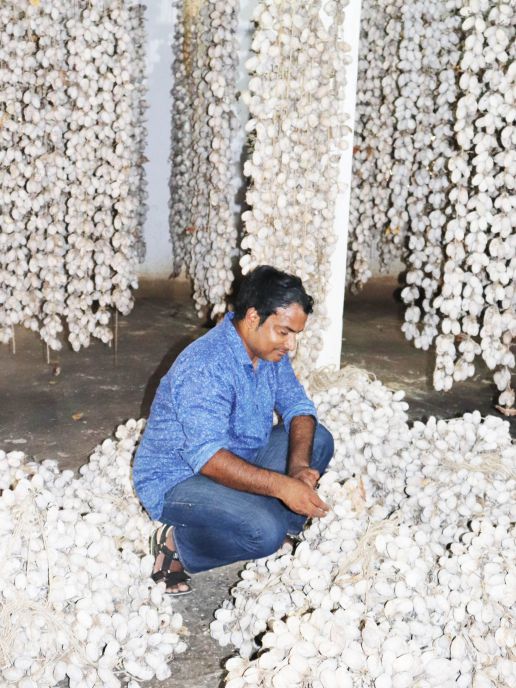
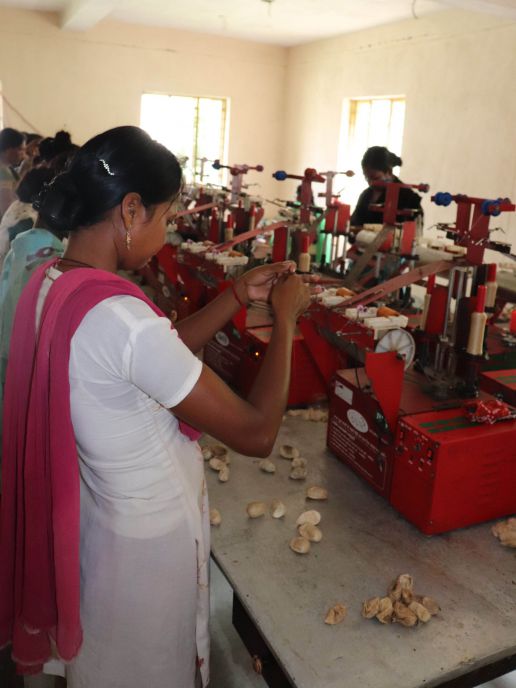
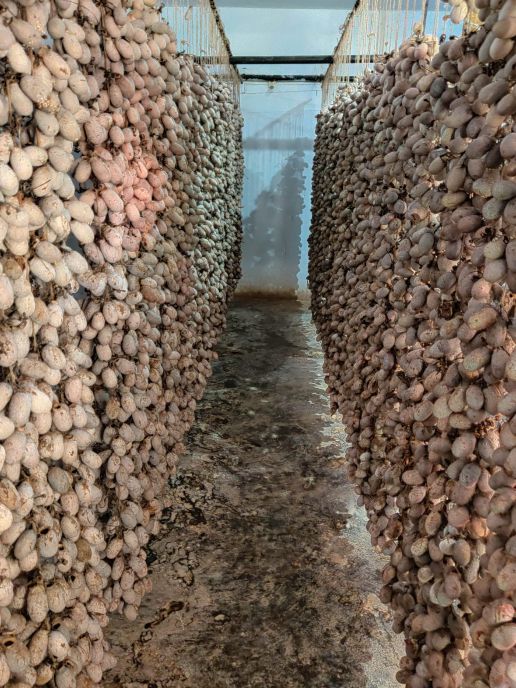
Our thanks to Chandra for his insights and joining us in conversation as part of the Key Conversation series with Sustainable Innovations curator, Simon Angel. If you’re interested in the topics discussed here by Chandra Prakash or to find out how you can support his work you can contact him here: prakash@cocccon.de
Let’s keep the conversation going … did this project spark an idea or do you have any questions? We’d love to hear from you, send us an email to info@munichfabricstart.com
Key Conversations: Seamless Production with Mushroom Mycelium
Dutch designer Aniela Hoitink is on a mission to change the way we use textiles. Known as the living material, with MycoTEX Aniela harnesses the organic and living properties of the compostable mushroom roots. Showcased in our forum for Sustainable Innovations in 2018, MycoTEX® is the ground breaking automated seamless manufacturing method allowing for custom-made products made from compostable mushroom roots.
As is the nature of living things, change and progress is a constant. From the early beginnings until now, Aniela takes us on her journey and talks us through the evolution of this sustainable innovation. From founding her own company, NEFFA, to scaling up production of MycoTEX, here’s how Aniela is changing the future of textiles.
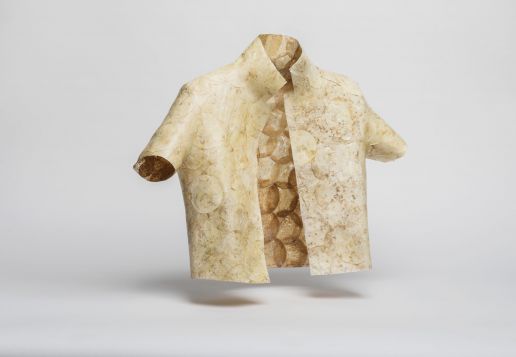
How has your work evolved since you exhibited at our innovation hub Keyhouse in 2018 as part of the Sustainable Innovations forum?
Based on feedback we received from brands and consumers, we have changed our growing method and successfully created samples which are smooth and can feature a variety of textures for unique placement options. Now further on, the first reactions from potential customers are very promising. We are working towards the development of a pilot collection over the next 12 months. Even more exciting, we have now established our company NEFFA. We have expanded our team and are raising a first funding round to produce the pilot production.
Have you seen a change in the way companies approach collaborations in the last few years?
The interest in sustainable materials has grown extensively. The goal is to find out how sincere this interest is. Do they really want to start working with your materials and products or are they just filling up their library?
What is the difference between MycoTEX and other (mycelium) materials?
Most companies are interested in developing sustainable materials that fit into the conventional supply chain, as this is the easiest way to make an impact. This conventional production method is based on cutting & sewing and overproduction. This way of production generates a lot of waste, waste that once needed water, nutrients and CO2. Our holistic approach led us to the development of an automated seamless manufacturing method for biomaterials. This allows us to make a bigger impact in terms of sustainability rather than using sustainable materials alone. As our method is not based on cutting & sewing, we do not have this production waste. Furthermore, our supply chain is much more flexible and allows for personalisation at mass production scale.
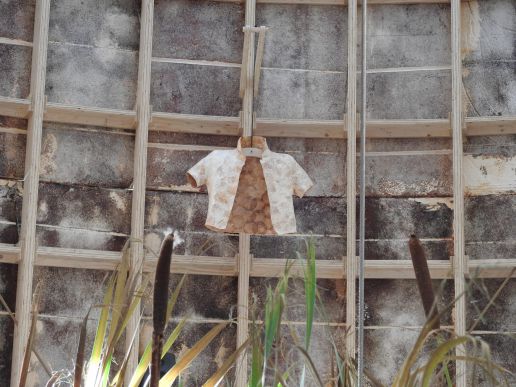
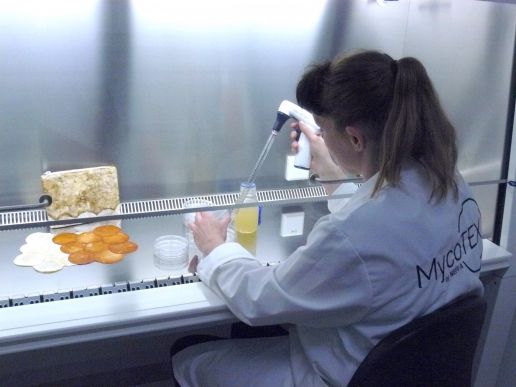
You are now in the process of scaling up the production of MycoTEX, can you share the highs & lows as well as the challenges you face to make this a reality?
Developing any company from scratch is hard but rewarding if you have a vision to follow. For us, the highs are all of the steps we take in the right direction. From finding the right partners who agree with your vision from the very first slide you show, to improving the material and achieving the result you like and more importantly seeing potential customers liking those results too.
The challenge is getting investors on board. A small ROI (return on investment) is something that most investors don’t like. The search to find the right investors takes a long time, trying to find those who are willing to join us and make an impact in the fashion industry. Clients are now used to sourcing sustainable materials and are approaching us for that reason. MycoTEX offers a product made using a seamless manufacturing technology which differs from the usual offer of fabrics by sheet or by meter. It can be challenging to convince them that our method is actually much more sustainable and worth the trouble to work with such an innovation.
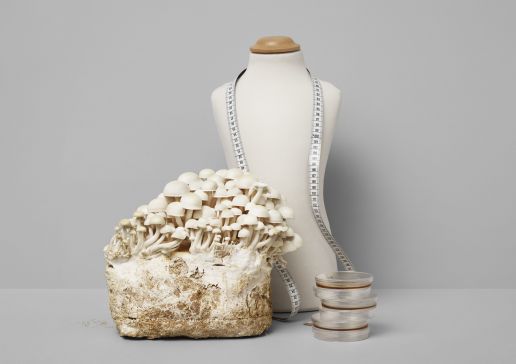
MycoTEX was recently awarded the Solar Impulse Efficient Solution Label, can you tell us what this will do for MycoTEX?
To receive the “Solar Impulse Efficient Solution” Label, MycoTEX was thoroughly assessed by a pool of independent experts according to 5 criteria covering the three main topics of feasibility, environmental impact and profitability. It is an external validation of our solution, which helps in attracting customers and investors, as this is a proof of high standards in profitability and sustainability.
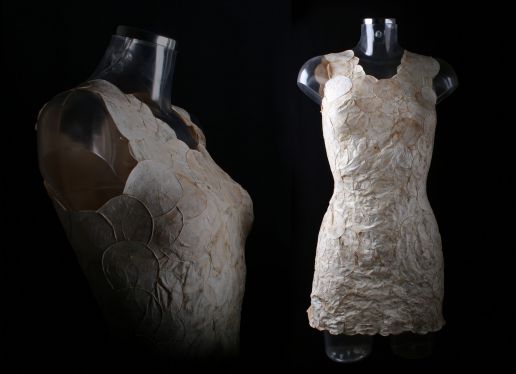
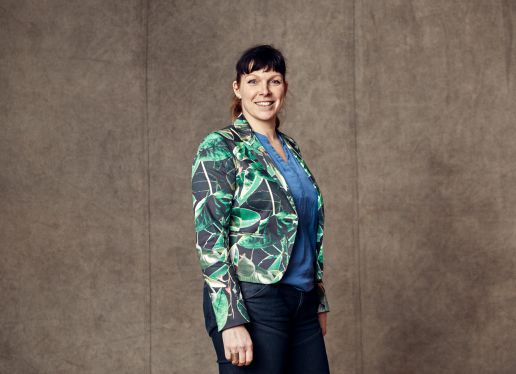
Who is your dream company to collaborate with and why?
We would like to work with innovative companies who are eager to rethink products being made, companies like Alexander McQueen, Martin Margiela or Mugler. Imaging the different shapes you can make if there is no need for seems, not even a shoulder or side seam. Kim Kardashian would be our dream type. Her curvy body is quite a challenge from a pattern-drawing point of view. With our seamless manufacturing method we could create the perfect fitting jacket for her.
Our thanks to Aniela for her insights and joining us in conversation as part of the Key Conversation series with Sustainable Innovations curator, Simon Angel. If you’re interested in a collaboration with Aniela Hoitink, she’d love to hear from you! Find out more here: https://neffa.nl/contact/
Let’s keep the conversation going … did this project spark an idea or do you have any questions? We’d love to hear from you, send us an email to info@munichfabricstart.com


